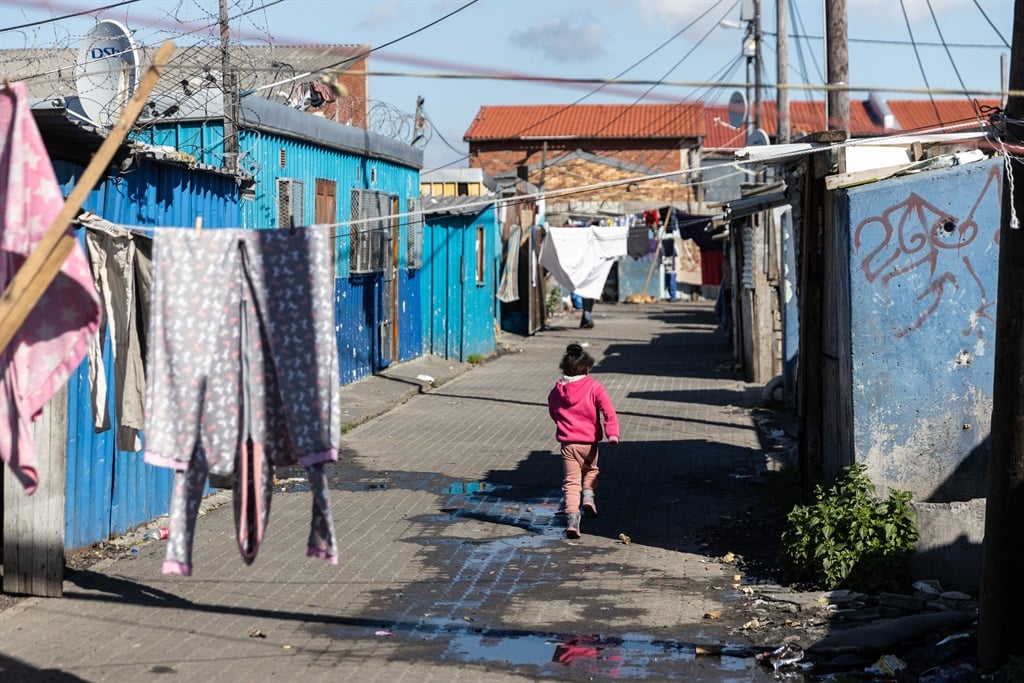Flamingo Heights is an informal settlement in Lansdowne, Cape Town, which has roads and running water. (Ashraf Hendricks/GroundUp)
- Flamingo Heights has 100 homes – and it has running water, sanitation and electricity.
- But it also has unemployment, blocked drains and electricity outages.
- In addition, the community has to deal with crime, substance abuse and domestic violence.
Tucked away in the heart of Lansdowne in Cape Town is the little settlement of Flamingo Heights, established in 2014.
On the face of it, this is an informal settlement with a difference: there are wide paths between shacks, and each home has its own running water, sanitation and electricity connection.
But residents say life there is tough, according to GroundUp.
Some people have been living in the settlement, on land owned by the City of Cape Town, since 2005.
In 2014, people living near the train station and under Lansdowne Bridge were moved there by what was then the City’s “Vagrant Unit”.
In 2014, the City “reblocked” the settlement, reconfiguring the shacks into clusters, and creating space between for vehicles.
Today, about 400 people live there, say residents, in 100 homes. Most are unemployed.
Each house has a flush toilet and running water, but residents say drains are often blocked and there are rats.
“The City used to provide us with those pills to kill the rats, but they stopped about six years ago. Now, we have to kill them ourselves,” said Jamie-Lee Sauls, an unemployed mother of three, who shares a home with her mother.
Residents also complain about electricity outages.
Xanthea Limberg, the City’s Mayco Member for Energy, said that, after complaints to the ward councillor, a team had visited the settlement and was attending to faults.
The ward councillor, Mark Kleinschmidt, said he regularly visited Flamingo Heights.
“We act on these as soon as possible,” he said.
However, with flooding, repairs sometimes take time.
It’s a perpetual, ongoing challenge,” he said.
Another resident, Sheila Siedras, was among the first people to be moved to the settlement.
She runs a tuck shop from a three-room shack, which she shares with her seven dogs and two cats.
Standing in her kitchen as her pot comes to a boil on the stove, Siedras tells GroundUp that “life is very deurmekaar [chaotic] here”.
“It’s a mixture of drug dealing, domestic violence, electricity problems and just bad things that young children are exposed to,” said Siedras.
She said there was a lot of alcohol abuse and fighting.
Flamingo Heights has a crèche, called Little Paradise, which caters for about 25 infants and children up to the age of six.
The manager, Charlene Anthony, said it was a no-fee crèche, funded by the founders who also provided food for the children.
The chairperson of the Flamingo Heights committee, Lenrika Dekoker, said she had been living in Flamingo since 2005.
She said things had improved since the reblocking.
READ | City of Cape Town fires urban waste director over refuse collection collapse
“We didn’t have many basic services back then. We had chemical toilets and only two standpipe taps for the whole community. Most of the structures were in a bad state, there was serious flooding when it rained, and there were no roads, so emergency services could not come through.
“Ambulances had to wait in the road outside the settlement and then the patient would have to be brought. The reblocking has made it much easier now because we have roads and our structures are fireproof from the outside,” said Dekoker.
She added that Flamingo Heights, in her opinion, was much better than other informal settlements on the Cape Flats.
“We do get affected by crime, which mostly happens in surrounding areas, like Lansdowne – and yes, people drink and sometimes that leads to violence, but, all in all, crime is not huge.
READ | Cape Town mayor and housing activists clash over old Woodstock Hospital
“I think, as residents in Flamingo, we are quite lucky. There is a lot of unemployment, but the help we get is amazing. Sometimes, people come to Flamingo to give out food to the community… on holidays, like Easter, we get fish, and the little children get party packs.
“The only thing that I would say Flamingo desperately needs are programmes that will uplift our youth,” said Dekoker.
